Nestled in the heart of Toronto’s financial district, Investissement Durable represents a bold vision for water technology investment. This AGF Investments initiative combines rigorous financial analysis with an unwavering commitment to environmental stewardship. By focusing on transformative water technologies – from smart infrastructure to advanced treatment solutions – they’re not just funding innovation, they’re architecting water’s sustainable future. Their approach transcends traditional investment metrics, recognizing that true value creation in the water sector requires patient capital, deep technical expertise, and an appreciation for water’s fundamental role in both ecosystem and economic health.
Investment Durable is part of my Ultimate Water Investor Database, check it out!
Investor Name: Investissement Durable
Investor Type: Impact
Latest Fund Size: $150 Million
Dry Powder Available: Yes
Typical Ticket Size: $250k – $1M
Investment Themes: PFAS removal, digital twins, decentralized water treatment
Investment History: $0 spent over 3 deals
Often Invests Along: Emerald Technology Ventures
Already Invested In: Aganova, FIDO Tech
Leads or Follows: Follow
Board Seat Appetite: Moderate
Key People: Emily Clark
The Investment Philosophy: Where Water Meets Wealth

At the core of Investissement Durable’s strategy lies a sophisticated dual-mandate approach that seamlessly integrates environmental stewardship with financial performance. Their investment thesis centers on identifying water technology solutions that not only address critical challenges in water security and sustainability but also demonstrate clear pathways to scalable market adoption and profitable growth.
The firm employs a rigorous three-tiered evaluation framework to assess potential investments. The first tier examines technological differentiation and intellectual property protection, ensuring portfolio companies possess truly innovative solutions rather than incremental improvements. The second focuses on market opportunity and adoption barriers, analyzing factors like regulatory tailwinds, customer pain points, and competitive dynamics. The third tier scrutinizes management capability and execution strategy.
What sets Investissement Durable apart is their unique risk assessment methodology that quantifies both financial and environmental impact metrics. They have developed a proprietary scoring system that evaluates water savings potential, energy efficiency improvements, and pollution reduction capabilities alongside traditional financial indicators. This approach enables them to identify opportunities where environmental benefits actually drive superior financial returns rather than competing with them.
Their investment criteria particularly favor technologies that demonstrate scalability across multiple markets and applications. The firm seeks solutions that can be deployed in both developed and emerging economies, recognizing that water challenges are universal but require locally adapted approaches. They also prioritize technologies with clear competitive moats and strong unit economics that improve with scale.
Critically, Investissement Durable’s strategy incorporates a longer investment horizon than typical venture capital firms, acknowledging the extended timelines often required for water technology commercialization. This patient capital approach, coupled with their deep sector expertise, allows them to support portfolio companies through the critical phases of product development, market entry, and scale-up.
Their risk mitigation framework particularly stands out for its emphasis on regulatory and adoption risks. Drawing from their extensive experience in the water sector, they maintain a comprehensive database of water quality standards, environmental regulations, and market-specific requirements across different geographies. This enables them to accurately assess compliance risks and market access barriers for new technologies.
As outlined in how to actively invest philanthropy and save the water world, the firm’s approach demonstrates how strategic capital deployment can simultaneously generate attractive returns while advancing critical environmental objectives. Their investment philosophy has proven that water technology innovations can deliver both substantial environmental impact and compelling financial performance when properly evaluated and supported.
Portfolio Innovation: Technologies Shaping Tomorrow’s Water
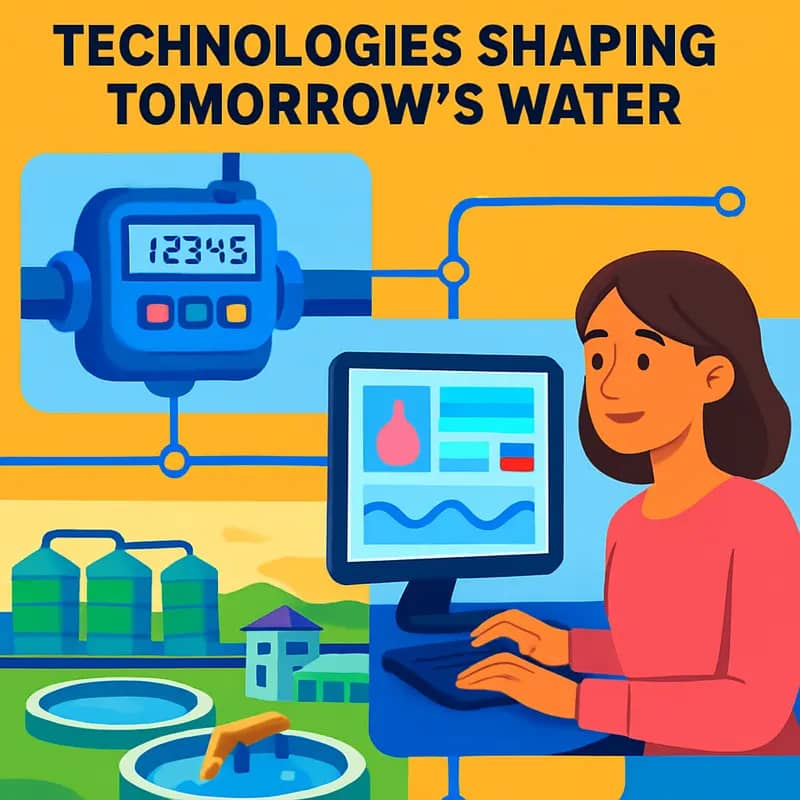
At the heart of Investissement Durable’s portfolio lies a carefully curated selection of breakthrough water technologies that are fundamentally transforming how we detect, treat, and manage water resources. Their investments span the full spectrum of innovation, from early-stage ventures to scale-up companies delivering proven solutions.
The fund’s artificial intelligence and machine learning investments are producing remarkable advances in leak detection and predictive maintenance. Their portfolio companies leverage sophisticated sensor networks and advanced algorithms to identify potential pipeline failures before they occur, reducing water losses by up to 30% in pilot deployments. Learn more about how AI is reshaping leak detection.
In water treatment, Investissement Durable has placed strategic bets on next-generation membrane technologies that significantly reduce energy consumption while improving contaminant removal. Their portfolio includes companies developing biomimetic membranes that replicate natural filtration processes, achieving 40% greater efficiency than conventional systems. These innovations are particularly impactful in addressing emerging contaminants like PFAS and pharmaceutical compounds.
The fund has also made significant investments in water reuse and resource recovery technologies. Their portfolio companies are pioneering closed-loop systems that extract valuable materials from wastewater streams while producing high-quality recycled water. One standout example involves a technology that simultaneously removes phosphorus and nitrogen while generating renewable energy, transforming treatment plants from energy consumers to producers.
Digital water management platforms represent another key focus area. These solutions integrate real-time monitoring, advanced analytics, and automated control systems to optimize water infrastructure operations. The resulting improvements in efficiency and reliability have enabled utilities to reduce operating costs by 15-20% while enhancing service quality.
Investissement Durable’s commitment to technological innovation extends to nature-based solutions, where they support companies developing enhanced wetland systems and bioengineered treatment processes. These approaches combine cutting-edge science with ecological principles to deliver sustainable, resilient water management solutions.
The fund’s portfolio demonstrates a clear understanding that tomorrow’s water challenges require more than incremental improvements. By backing transformative technologies across multiple domains, Investissement Durable is helping to build a future where water resources are managed more efficiently, sustainably, and equitably.
Impact Metrics: Beyond Financial Returns
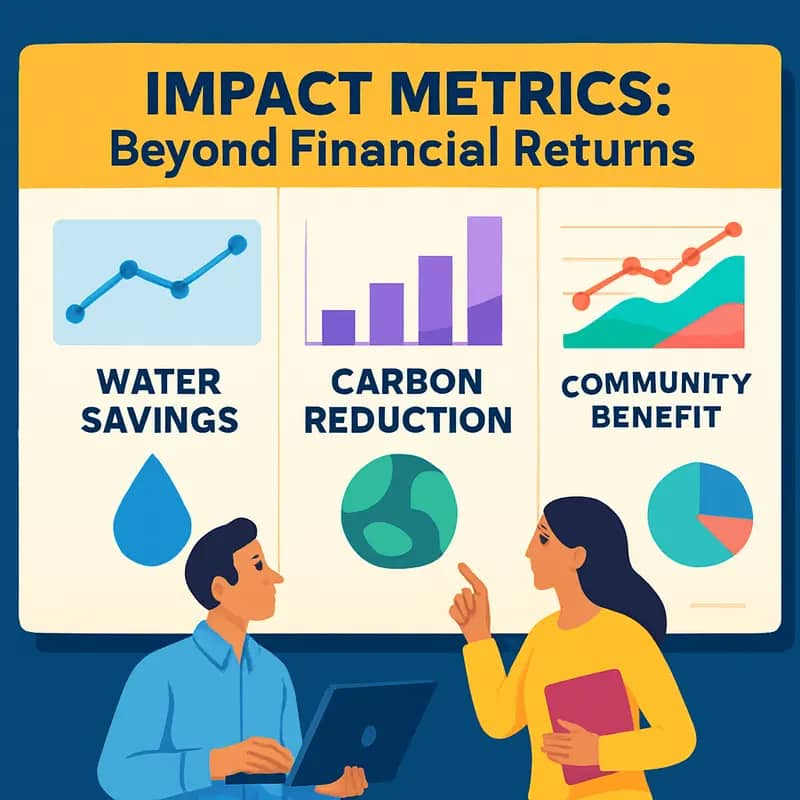
Investissement Durable has pioneered a comprehensive impact measurement framework that extends far beyond traditional financial metrics. At its core lies a sophisticated set of water-specific indicators that capture both quantitative and qualitative dimensions of their portfolio companies’ environmental and social contributions.
The firm’s water conservation tracking system monitors cubic meters saved through efficiency improvements, leak reduction, and water reuse initiatives across their investments. The data reveals that portfolio companies collectively prevented over 2.5 billion liters of water waste in the past year alone. Real-time monitoring systems provide granular insights into peak usage patterns, helping identify additional optimization opportunities.
Beyond pure volume metrics, Investissement Durable evaluates water quality improvements through a multi-parameter assessment that includes turbidity reduction, contaminant removal rates, and ecosystem health indicators in receiving water bodies. Their proprietary scoring system assigns weighted values to different impact categories, creating a standardized way to compare diverse water technology solutions.
The social impact dimension focuses on community access to clean water, affordability metrics, and local economic benefits. Through regular stakeholder surveys and on-ground assessments, the firm tracks how their investments affect water availability in underserved regions. A notable success story emerged from their smart metering initiative, which helped a water-stressed municipality reduce non-revenue water losses by 40% while maintaining stable consumer tariffs.
To ensure accountability, all impact data undergoes third-party verification against established standards like how to mitigate 4 shades of water risk through impact investing. The firm has developed an innovative blockchain-based reporting system that provides unprecedented transparency into impact claims. This technology creates an immutable record of environmental and social outcomes, building trust with investors and stakeholders.
Investissement Durable’s impact measurement approach also considers the multiplier effects of water innovation. When portfolio companies introduce new technologies, the firm tracks adoption rates across industries and geographies. This helps quantify the broader market transformation toward sustainable water management practices. Special attention goes to measuring carbon footprint reductions achieved through water efficiency gains, acknowledging the crucial water-energy nexus.
The firm regularly publishes detailed impact reports that combine quantitative metrics with qualitative case studies, creating a comprehensive picture of their contribution to global water sustainability. This rigorous approach to impact measurement has not only attracted mission-aligned investors but has also helped portfolio companies optimize their operations for maximum environmental and social benefit.
Future Horizons: The Next Wave of Water Investment
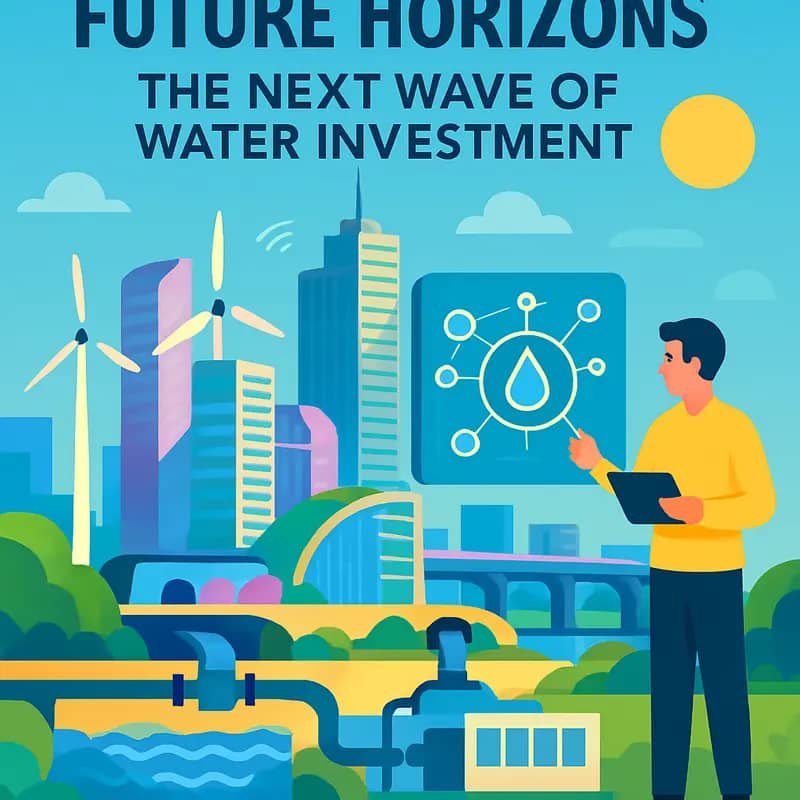
As global water challenges intensify, Investissement Durable is strategically positioning itself at the forefront of emerging water technology solutions. Building on their established impact metrics framework, the firm is orchestrating a bold vision for the future of water investment that combines technological innovation with sustainable finance principles.
A key focus area is the acceleration of digital water technologies, particularly solutions leveraging artificial intelligence and advanced analytics for resource optimization. The firm recognizes that smart water management systems could help save up to 136 trillion liters annually through improved leak detection and distribution efficiency. Their investment strategy targets companies developing predictive maintenance platforms, real-time monitoring systems, and digital twins for water infrastructure.
Investissement Durable is also scaling up investments in water recycling and reuse technologies, particularly those enabling decentralized treatment systems. The firm anticipates exponential growth in this sector as water scarcity drives adoption of closed-loop solutions across industries. Their portfolio increasingly includes innovations in membrane technology, advanced oxidation processes, and resource recovery systems that transform wastewater into valuable products.
Climate resilience represents another strategic priority, with the firm actively seeking technologies that help communities adapt to extreme weather events and changing precipitation patterns. This includes flood management solutions, drought-resistant infrastructure, and climate-smart agricultural water systems. The investment team is particularly interested in nature-based solutions that provide multiple environmental benefits while generating competitive returns.
To amplify their impact, Investissement Durable is pioneering new financial instruments that better align with the long-term nature of water infrastructure investments. They’re developing blended finance vehicles that combine institutional capital with concessional funding to derisk early-stage water technologies. The firm is also exploring innovative revenue-sharing models and environmental impact bonds that tie returns to measurable water conservation outcomes.
Beyond individual investments, Investissement Durable aims to catalyze broader market transformation. They’re actively building partnerships with utilities, municipalities, and industrial water users to create deployment pathways for portfolio companies. The firm also advocates for policy frameworks that properly value water resources and incentivize sustainable water management practices.
This comprehensive approach positions Investissement Durable to capitalize on the estimated $1 trillion annual investment opportunity in water infrastructure while delivering meaningful environmental and social impact. Their strategy acknowledges that solving global water challenges requires not just technological innovation, but also new financial models and market structures that enable rapid scaling of solutions.
The Investment Watershed Moment
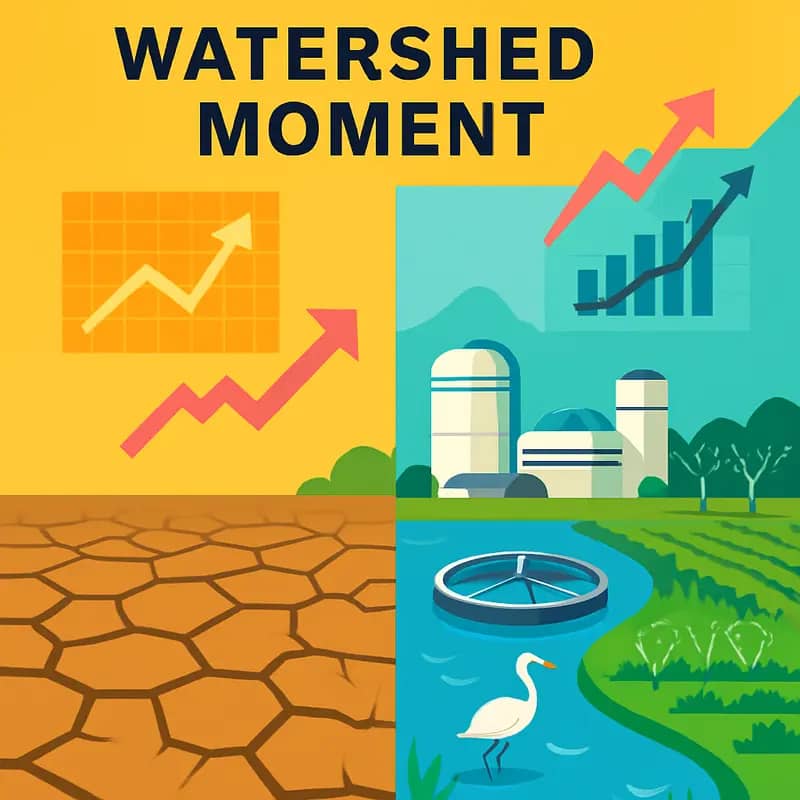
The sustainable water investment landscape stands at a pivotal inflection point, driven by an unprecedented convergence of climate pressures and mounting resource demands. Global water infrastructure requires an estimated $6.7 trillion investment by 2030 to meet rising needs, creating a watershed moment for sustainable finance.
Climate change acts as a powerful catalyst, intensifying water scarcity and extreme weather events while disrupting traditional water management approaches. Rising temperatures and shifting precipitation patterns stress aging infrastructure systems designed for previous climate conditions. Meanwhile, rapid urbanization and population growth compound these challenges, with global water demand projected to exceed supply by 40% within the next decade.
These pressing challenges are reshaping the water technology investment thesis. The market for innovative water solutions is experiencing remarkable expansion, with the global water technology market expected to reach $1.2 trillion by 2025. Smart water management, advanced treatment technologies, and resource recovery solutions represent particularly promising growth segments.
Investors increasingly recognize water technology’s defensive characteristics and growth potential. Water utilities demonstrate strong recurring revenues and regulated returns, while technology providers offer exposure to high-growth market segments. The sector’s essential nature and natural monopoly characteristics provide stability, while innovation drives expansion opportunities.
However, the most compelling investment opportunities lie in solutions addressing critical pressure points. Water reuse and recycling technologies are gaining traction as circular economy principles reshape industrial water management. Advanced analytics and AI-enabled solutions help utilities optimize operations and reduce losses. Nature-based infrastructure approaches offer cost-effective alternatives to traditional gray infrastructure.
Significantly, water technology investments deliver measurable environmental and social impact alongside financial returns. This dual benefit particularly appeals to the growing pool of impact-oriented investors seeking to address water security while generating sustainable returns. As noted in a comprehensive analysis of water risk assessment, proper evaluation of water-related risks and opportunities can unlock substantial value.
The convergence of urgent water challenges, technological innovation, and growing investor interest creates ideal conditions for accelerated capital deployment. Forward-thinking investors recognize that early positioning in transformative water solutions offers both attractive returns and meaningful environmental impact. This watershed moment demands strategic capital allocation to scale promising technologies and business models that can reshape the water landscape for decades to come.
Technology Waves: Innovation in Water Management
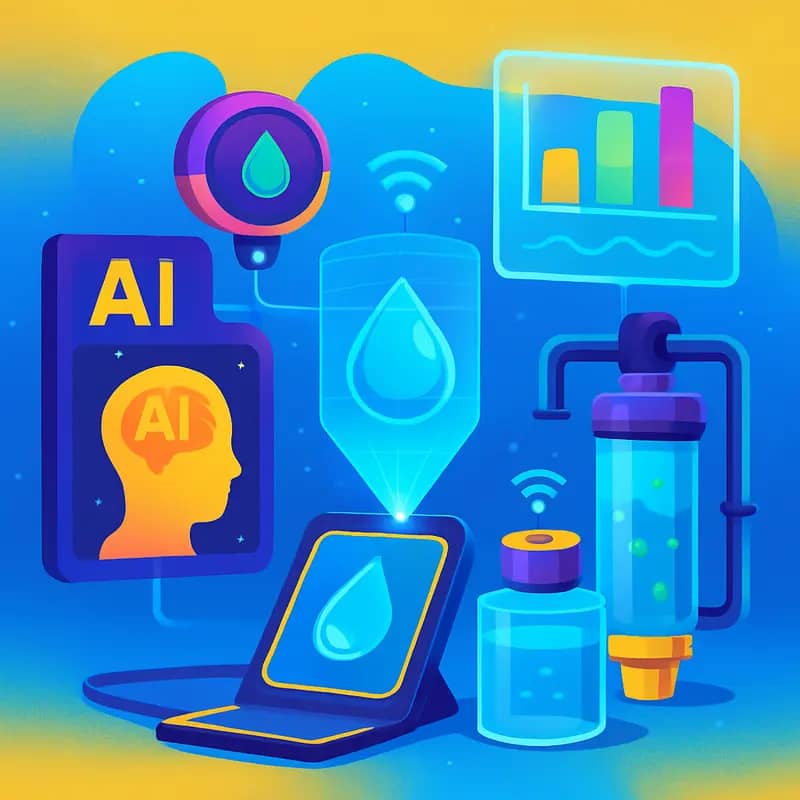
Breakthrough technologies are fundamentally transforming how we monitor, treat, and distribute water resources. At the forefront of this revolution is artificial intelligence, which has enabled unprecedented advances in leak detection and predictive maintenance. Advanced machine learning algorithms can now analyze vast streams of sensor data to identify potential pipeline failures before they occur, reducing water losses by up to 30% in pilot implementations.
Parallel innovations in filtration technology have dramatically improved water treatment efficiency. Novel membrane materials incorporating biomimetic principles show remarkable ability to remove contaminants while requiring significantly less energy. These advanced filtration systems can handle increasingly complex pollutant combinations, from microplastics to emerging pharmaceutical compounds.
Perhaps most promising is the convergence of different technological domains. Smart sensors combined with AI-powered analytics platforms create comprehensive water management systems that optimize operations in real-time. One pioneering project successfully integrated leak detection, quality monitoring, and automated control systems to reduce operating costs by 25% while improving water quality metrics.
The application of digital twin technology represents another quantum leap forward. These sophisticated virtual models simulate entire water networks, enabling operators to test different scenarios and optimize system performance without risking real-world disruptions. Early adopters report substantial improvements in operational efficiency and disaster preparedness.
Yet innovation extends beyond hardware and software. New financing models are emerging that help utilities adopt these technologies despite budget constraints. Performance contracts that link payments to achieved water savings have proven particularly effective in accelerating the deployment of smart water solutions.
The integration of renewable energy with water treatment processes showcases how technological convergence can multiply benefits. Solar-powered desalination plants and energy-neutral wastewater treatment facilities demonstrate the potential for sustainable water management at scale. These solutions address both water scarcity and climate concerns simultaneously.
As we look ahead, emerging technologies like quantum sensors and advanced materials science promise to push capabilities even further. The key to success lies not just in individual innovations, but in creating integrated solutions that address multiple challenges across the water cycle. This systems-thinking approach, combined with rapidly advancing technology, creates unprecedented opportunities to reshape water management for a more sustainable future.
Impact Metrics: Measuring the Ripple Effect
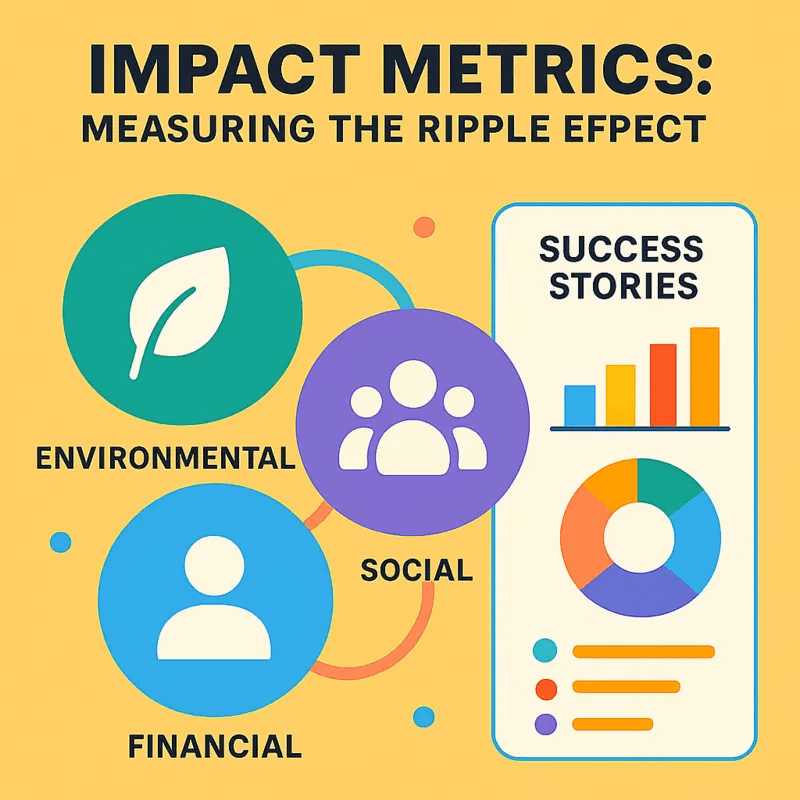
Measuring the impact of water investments requires a sophisticated blend of quantitative and qualitative metrics that capture both financial returns and broader societal benefits. Leading investors are adopting standardized frameworks to evaluate their water-focused portfolios.
The Water Impact Index (WII) has emerged as a cornerstone metric, evaluating investments across three critical dimensions: water quality, water quantity, and ecosystem health. This comprehensive approach allows investors to assess not just immediate financial gains but long-term environmental sustainability.
A compelling case study from the Great Lakes region demonstrates these metrics in action. An investment consortium deployed $50 million into advanced filtration technologies, tracking both traditional ROI metrics and environmental impact indicators. The project achieved a 15% financial return while reducing water consumption by 40% and improving water quality scores by 60%. Most notably, the standardized measurement framework allowed for clear communication with stakeholders and accurate comparison with other investments.
Beyond environmental metrics, social impact indicators have become increasingly crucial. These include access to clean water, community health improvements, and job creation. The United Nations Sustainable Development Goal 6 (SDG 6) framework provides a standardized approach for measuring these social outcomes, with specific indicators for water accessibility, quality, and sustainable management.
Innovative measurement tools are also emerging to capture previously overlooked impacts. Satellite imagery and IoT sensors now enable real-time monitoring of watershed health, while blockchain technology ensures transparent tracking of water usage and quality data. These technological advances have made impact measurement more precise and credible.
Investors are also adopting the concept of “water handprint” alongside the traditional water footprint measurement. While water footprint measures negative impacts, water handprint quantifies positive contributions, such as water saved or cleaned through innovative technologies. This dual approach provides a more balanced view of investment impact.
The financial sector has responded by developing specialized water-focused sustainability-linked bonds, where interest rates are tied to achieving specific water impact metrics. This alignment of financial incentives with environmental and social goals represents a significant evolution in sustainable finance.
As measurement frameworks mature, attention is turning to standardization and verification. Third-party auditors now play a crucial role in validating impact claims, while industry working groups are developing consensus around key performance indicators. This standardization is essential for scaling water investments and ensuring comparability across projects and regions.
Strategic Deployment: From Concept to Scale
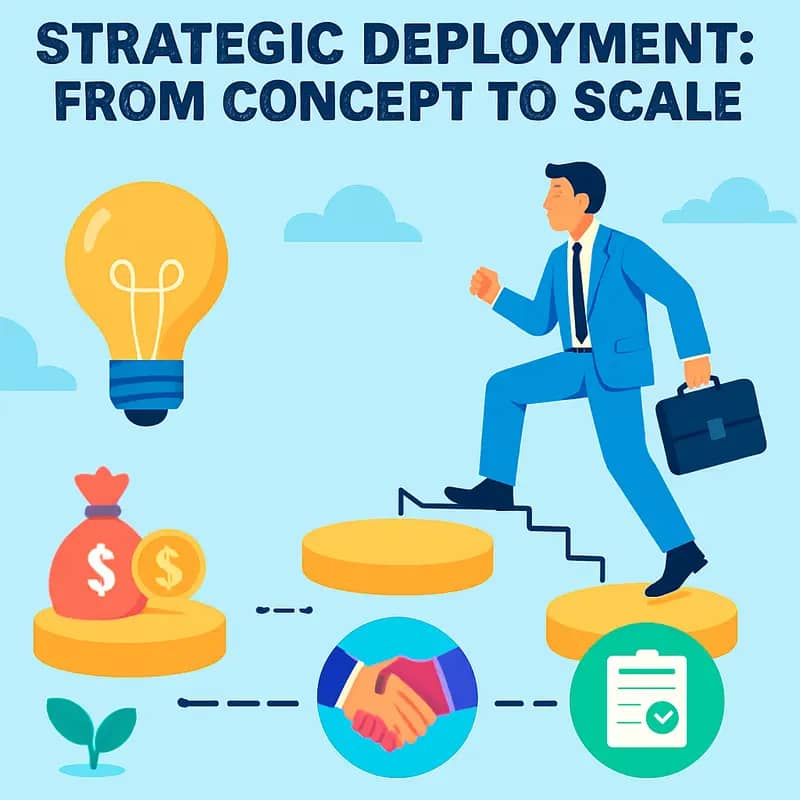
Scaling water solutions requires a carefully orchestrated approach that balances technological innovation with market dynamics and regulatory requirements. The path from proof-of-concept to widespread adoption demands strategic planning across multiple dimensions.
Successful deployment begins with selecting the right pilot partners. Utilities and industrial facilities that can serve as early adopters should have both the technical capability to evaluate solutions and the willingness to share performance data. These initial implementations establish crucial credibility while surfacing practical operational challenges that need addressing before broader rollout.
Regulatory navigation represents a critical success factor in scaling water technologies. Early engagement with regulatory bodies helps identify compliance requirements and potential barriers. Rather than viewing regulations as obstacles, forward-thinking entrepreneurs work collaboratively with agencies to demonstrate how their solutions advance public health and environmental protection goals.
Funding mechanisms must evolve as solutions scale. While early development often relies on grants and angel investment, expansion requires more substantial capital. A blended finance approach combining private equity, project finance, and innovative instruments like green bonds can provide the necessary resources. Performance-based financing models that link returns to measurable impact metrics are gaining traction, particularly for solutions addressing water quality and conservation.
Partnership strategies should extend beyond traditional customer-supplier relationships. Technology providers can accelerate market penetration by aligning with engineering firms, equipment manufacturers, and service companies that already have established distribution channels and customer relationships. Strategic alliances with larger water sector players can provide validation while opening access to global markets.
The operational infrastructure must scale in parallel with market growth. This includes developing standardized implementation processes, building remote monitoring capabilities, and establishing robust supply chains. Successful scaling requires striking a balance between customization and standardization – solutions must be adaptable enough to meet diverse customer needs while maintaining consistent quality and cost-effectiveness.
Talent acquisition and development become increasingly critical during rapid scaling. Beyond technical expertise, growing organizations need professionals skilled in project management, customer success, and regulatory affairs. Creating partnerships with universities and technical training programs can help build talent pipelines.
Measuring and communicating impact takes on greater importance at scale. Sophisticated data collection and analysis capabilities allow organizations to demonstrate both environmental and economic benefits. This evidence-based approach helps secure additional funding while building credibility with stakeholders across the water sector ecosystem.
Final words
Investissement Durable’s approach to water technology investment represents a crucial evolution in how we finance and scale solutions to global water challenges. Their success demonstrates that patient capital, combined with deep sector expertise and a commitment to sustainability, can generate both compelling returns and meaningful environmental impact. As water stress intensifies globally and the need for innovative solutions grows more urgent, their model offers valuable lessons for investors and entrepreneurs alike. The future of water investment isn’t just about identifying promising technologies – it’s about building an ecosystem that can nurture and scale solutions for lasting impact. Through their thoughtful approach to portfolio construction, rigorous impact measurement, and long-term vision, Investissement Durable is helping chart a course toward a more water-secure future.
Wanna explore the Full List of Water Investors that cut at least two checks over the past decade? Check it out and bookmark it, I update it regularly!
Learn more: https://dww.show/the-ultimate-water-investor-database/
About us
Through my “(don’t) Waste Water” platform, I offer unique and insightful coverage of the water industry that combines technical expertise with engaging storytelling. If you haven’t yet, it might be time for you to subscribe to the podcast, the youtube channel and/or the newsletter!
